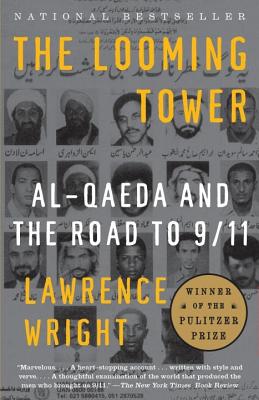At one point a few years after 9/11, I decided I could not bring myself to consume another news story about terrorism or war. I couldn’t pay meaningful attention to headlines that telegraphed so much death. But as time passed I began turning to a string of books on war and conflict (among them Dexter Filkins’s The Forever War and David Finkel’s The Good Soldiers) that I felt compelled to reckon with, to educate myself with deeply reported narratives that transcended the relentless news cycle.
Lawrence Wright’s Pulitzer Prize–winning The Looming Tower: Al-Qaeda and the Road to 9/11 was one of these, and there are few nonfiction books I’ve recommended more. Often reading like a novel, The Looming Tower is a vivid, gripping freight train of a story that speeds through the twentieth century to explain how the birth of fundamentalism, the rise of Al-Qaeda, and the American government’s intelligence failures all made 9/11 horrifyingly possible.
The enormous cast of characters spans five decades and virtually the entire world. But at center stage, of course, is Osama bin Laden, and it’s fascinating to read about him before he became the most wanted man on earth. He wasn’t always hell-bent on destroying America. Never having opposed American values or culture—he was a fan of the TV show Bonanza, had a wife who preferred American brand-name cosmetics, and let his children play Nintendo—he instead objected to the US’s military and political maneuvers in the Islamic world. At one point, as an investor and businessman in Sudan, he avoided a conflict in that country’s south, claiming he wanted to quit Al-Qaeda and become a farmer. He told his fellow Muslims to “discover the blessings of peace.” Among other influences, it was the presence of American troops in Saudi Arabia after the Gulf War that tipped him away from this idyllic life and sent him agonizing “over what he believed was a permanent occupation of the holy land.”
Essential, too, are Wright’s explanations of how suicide and the murder of innocent people—both forbidden by the Koran—came to be justified in the eyes of fundamentalists. It was a seismic turning point for jihad. And indeed, you are haunted by The Looming Tower’s reminder that modern terrorism is really an inversion of the Crusades, a war against nonbelievers who, in the eyes of fundamentalists, constantly threaten to impede what they see as Islam’s rightful domination of the world.
Read this essential book. It’s the best kind of ripped-from-the-headlines nonfiction: your eyes will be wide open when you finish.





